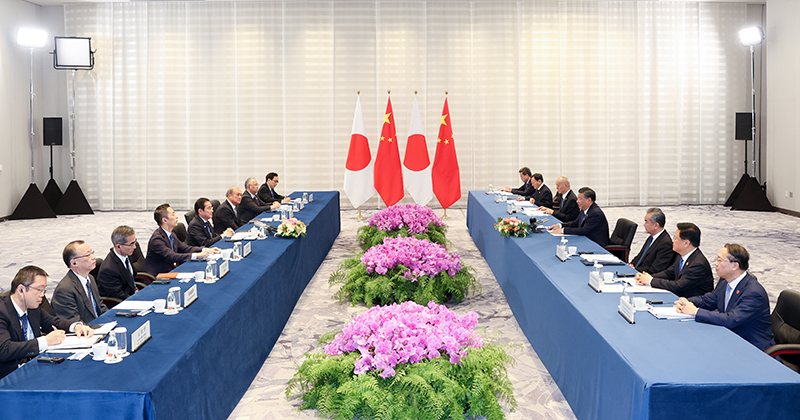SAN FRANCISCO: Chinese President Xi Jinping met with Japanese Prime Minister Fumio Kishida in San Francisco on Thursday.
The two leaders reaffirmed their commitment to the principles and consensus outlined in the four political documents between China and Japan. They reiterated the positioning of fostering a mutually beneficial relationship grounded in common strategic interests, and agreed to work together in building a constructive and stable China-Japan relationship that aligns with the requirements of the new era.
Xi expressed his pleasure to meet again with the prime minister. He said that during last year’s APEC meeting in Bangkok, they exchanged views on the strategic and directional issues of bilateral relations and reached important consensus.
This year marks the 45th anniversary of the Treaty of Peace and Friendship Between China and Japan. Xi said that the treaty legally formalized the goal of peace, friendship, and cooperation, marking it as a significant milestone in the history of the bilateral relationship between the two countries.
Over the past 45 years, guided by the principles outlined in the four political documents between China and Japan, there has been a general trend of progress in bilateral relations despite some ups and downs. This trend, Xi said, has benefited peoples of both countries and contributed positively to regional peace, development and prosperity.
Currently, the international landscape is marked by a complex mix of risks and challenges. Peaceful coexistence, enduring friendship, mutually beneficial cooperation, and shared development represent the correct path forward, aligning with the fundamental interests of both countries, Xi noted. He stressed the importance for both countries to follow the historical trend, concentrate on shared interests, and appropriately manage differences.
Major issues of principle related to history and Taiwan bear on the political foundation of China-Japan relationship, Xi said. He urged Japan to keep its word and stick to the principle.
Chinese President Xi noted the deep integration of economic interests, as well as industrial and supply chains between China and Japan, underscoring the need for deeper cooperation. He advocated for the protection of the global free trade system to elevate the level of mutual benefit and achieve a win-win situation.
Furthermore, Xi urged both countries to embrace true multilateralism, foster open regionalism, advance regional integration, and collaboratively tackle global challenges.
In terms of the issue of the discharge of contaminated water from the Fukushima nuclear plant into the ocean, Xi said that the action has implications for human health worldwide, the global marine environment, and international public interests. He urged Japan to earnestly consider both domestic and international concerns and address this issue responsibly and constructively.

For his part, Kishida Fumio said that the international community is currently at a historic crossroad, and Japan hopes to enhance high-level communications and dialogue with China, and foster positive dynamics in bilateral relations while upholding peaceful coexistence.
He said that Japan has no intention of decoupling from China and hopes to further promote cultural and people-to-people exchanges. He also stressed the importance of deepening practical cooperation in various areas, including the digital economy, green development, finance, healthcare, and elder care.
Additionally, Kishida reaffirmed Japan’s commitment to its path of peaceful development. On the Taiwan question, there has been no change whatsoever to the commitments Japan made in the Japan-China Joint Statement, he said.
The two countries expressed positive views on the newly established dialogue mechanism for export controls. They agreed to maintain communication and coordination on international and regional affairs, and to jointly tackle global challenges like climate change.
Furthermore, both countries agreed to seek a constructive solution through consultation and negotiation regarding the issue of discharging Fukushima’s nuclear-contaminated water into the sea.
The two sides also engaged in discussions on a range of international and regional issues of shared interest.























